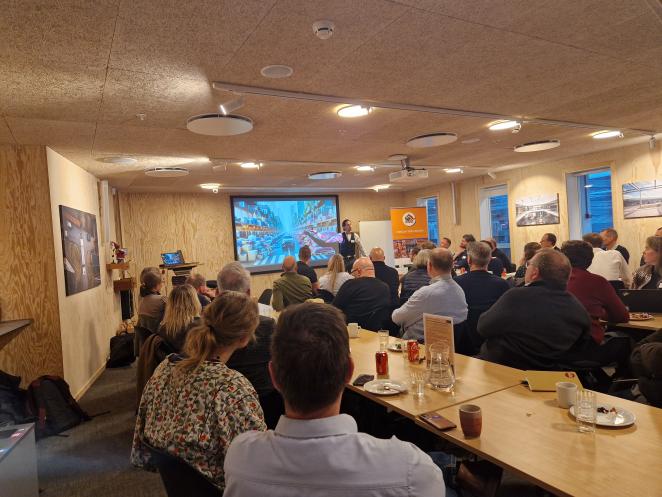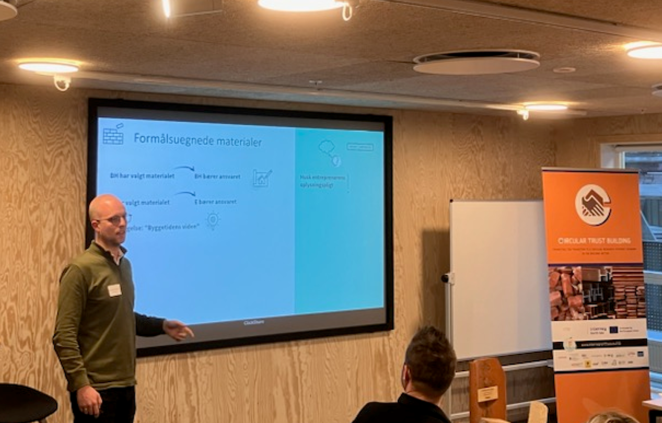Vejle Business organized an event for Circular Trust Building stakeholders from the entire value chain in construction at the Resource Centre Vejle (RCV). More than 50 participants gathered to learn more and discuss the practical and legal challenges involved in the development of tenders for recycled materials in building.
Lene Jellesen from Vejle Municipal Properties talked about the rules in the municipality’s Strategy for Sustainable Construction. She shared a number of local case examples, including Vejle Kommune ’s public library, currently being transformed into a cultural centre and the new Søndermarkshal which is built with recycled stones.

Sustainable construction in Vejle
Looking at practical experience in circular construction projects and CO2 budgets, Michael Meldgaard Thomsen of Sweco, shared that circular economy in construction is all about cooperation, understanding, responsibility and new roles in the value chain. “It is important to have active leadership in circular economy construction projects and overcome the challenges with selecting products, handling recycled materials, and integrating circular principles.“ Michael explained.
Meanwhile, his colleague Poul Møller, shared expertise on CO2 budgetting. Projects, whether they involve renovations, transformations, selective or complete demolition, must be seen in the perspective of a full value chain. Municipalities can play a leading role in creating positive value with carbon-neutral, recycled materials by reusing their own materials from demolitions and renovations, saving on the purchase of new materials and new construction.

Risk & allocation of responsibility
Speaking on behalf of Molt Wengel, a leading law firm in Denmark specializing in construction, Patrick Rask Buskbjerg shared experiences about early involvement in construction projects and a materials strategy. Material suppliers, functional requirements, risk assessment, insurance conditions and more passed the revue.
The legal framework for distribution, responsibility and risk when using recycled materials can be created by project developers, contractors and consultants during the tendering phase. “Taking action as early as possible is vital for scheduling, budgeting and the result of the project at large,” Patrick remarked. “It’s equally important to make the right decisions before the conceptual design, continuing throughout the project until completion. Settling such contractual agreements at the intitial stage creates the best possible conditions for collaboration, handling risks, reducing waste and risk.“

Recylcing resources, reducing CO2
The use of recycled materials in renovations, conversions and new construction is what Circular Trust Building is all about. Reusing materials not only reduces CO2, but also saves on resources. One of the points made by Søren Malund Thomsen from Kingo Carlsen in his presentation. Kingo is a frontrunning demolition company with sixty years of branch-specific experience, founded at a time when all building materials in construction were reused as a matter of course.
That value is making a comeback in building materials. “With a construction industry responsible for approximately 40% of Danish CO2 emissions, there is truly a lot to do - and we CAN do it! By carefully dismantling building materials, that can be efficiently reused in new construction.” said Søren.
This intial CTB stakeholder meeting in Vejle was valuable, sowing seeds for continued collaborations and inspiring participants with practical know-how. Vejle is developing a strong foundation for circular building practices and strategies in the region.
